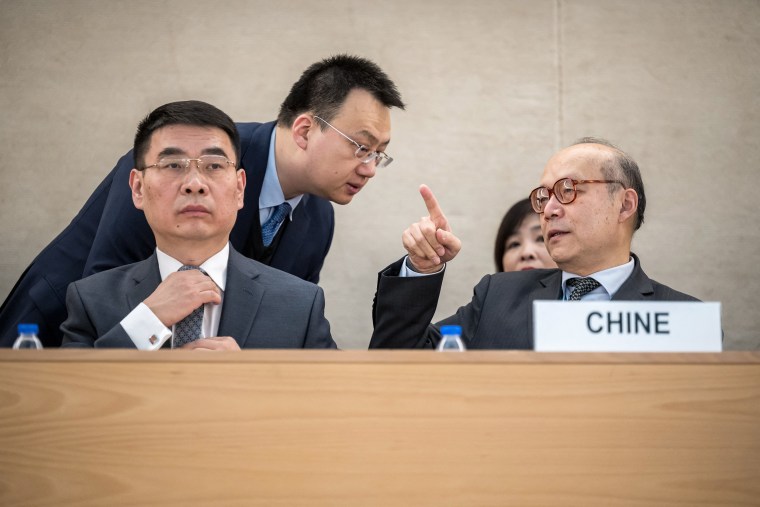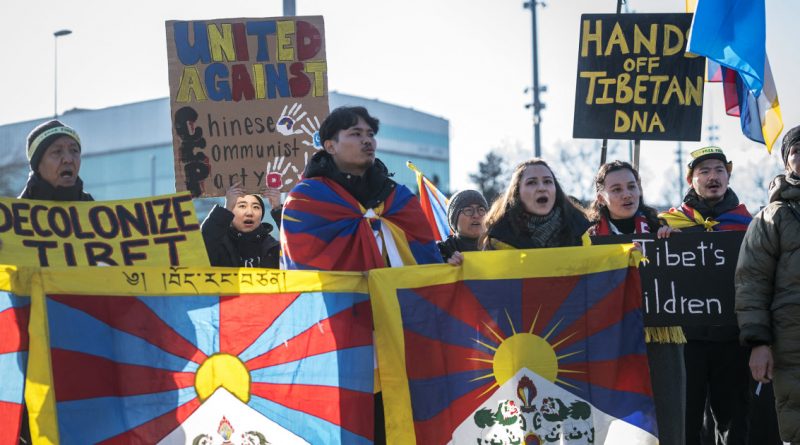China’s human rights record is scrutinized at U.N. meeting
GENEVA — Western countries used a regular U.N.-backed review of China’s human rights record Tuesday to press Beijing to do more to allow freedom of expression, protect the rights of ethnic minorities and to repeal a national security law in Hong Kong that troubles independent activists.
China’s ambassador in Geneva, Chen Xu, led a delegation from some 20 Chinese ministries for the “universal periodic review” conducted under the U.N. Human Rights Council. He stressed China’s progress in poverty eradication, said citizens engage in “democratic elections” and gave assurance that freedom of religious belief is safeguarded.
“China upholds respect for and protection of human rights as a task of importance in state governance,” Chen said through an interpreter. “We have embarked on a path of human rights development that is in keeping with the trend of the times and appropriate to China’s national conditions and so-called historic achievements in this process.”
“We uphold the people-centered philosophy and strive to deliver a better life for all the people,” he said.
An extraordinarily high number of more than 160 countries — some critics of Beijing, some allies — registered to take part in the discussion. That meant each country had a maximum of 45 seconds to speak, forcing some ambassadors into what at times felt like a speed-reading exercise.
China’s delegation had a total of 70 minutes to make its case.
The review process, which encourages constructive recommendations over sharp criticism, nevertheless gave way to firm, if not scathing, advice to China from some leading Western countries, while some of China’s friends rallied to its defense.
Ambassador Leslie Norton of Canada urged China to end “enforced disappearances targeting human rights defenders, ethnic minorities and Falun Gong practitioners.” Falun Gong is a spiritual movement.
Czech Ambassador Vaclav Balek said China needed to stop “the criminalization of religious and peaceful civil expression” and “cross-border kidnappings and intimidating Chinese citizens living abroad.” Slovenian Ambassador Anita Pipan recommended that China “establish a moratorium on the death penalty.”
U.K. Ambassador Simon Manley called for a halt to the prosecution of Jimmy Lai, a former Hong Kong publisher who is on trial for alleged national security violations, and an end to the forced repatriation of North Koreans who fled into China.
Kozo Honsei, Japan’s deputy permanent representative in Geneva, called for better protection of the rights of minorities in Tibet and northwestern China’s Xinjiang region. U.S. Ambassador Michele Taylor presented a list of concerns, concluding with, “We condemn the ongoing genocide and crimes against humanity in Xinjiang and transnational repression to silence individuals abroad.”
Some independent organizations and the United States have accused China of genocide against minority Muslim Uyghurs in Xinjiang, but no U.N. bodies have affirmed that. China lashed out at a 2022 report by the U.N.’s then-human rights chief citing possible crimes against humanity committed in the region.

The hearing offered a wide-ranging look at the human rights situation in China. Bolivia’s envoy commended China’s efforts to reduce deforestation, Burundi’s representative urged China to improve access to health care in central regions and to better housing in Hong Kong and Macao, and Iran praised China’s “national action plan for human rights.”
First secretary Ilia Barmin of Russia’s diplomatic mission advised China “to consistently improve the understanding and capacity of citizens to use standard spoken and written Chinese in Xinjiang.”
Many developing-world countries praised China’s policies on issues like poverty reduction and economic development policies while also offering suggestions to Beijing. Frankye Bronwen Levy, political affairs counselor for South Africa, called on China to strengthen an anti-domestic violence law passed eight years ago.
Hilary Power, the Geneva director of Human Rights Watch, called it “utterly shameful” that many countries opted to “use their platform at the U.N.’s top human rights body to praise Beijing’s rights record, or stay silent in the face of well-documented grave crimes.”
The “universal periodic review” puts all U.N. member states up for scrutiny — at times sharp — by other countries roughly every five years. The 3 1/2-hour discussion aims to offer constructive criticism and to yield a written report with recommendations. On Monday, countries examined Saudi Arabia’s rights record.
At China’s last review in 2018, the United States and other countries voiced concerns about its treatment of Muslim Uyghurs in Xinjiang.
Groups that included Falun Gong practitioners, Uyghurs and pro-Tibet activists held small demonstrations outside the U.N. Geneva compound during Tuesday’s discussion. Inside, roughly 100 activists from nongovernmental groups attended the session or watched it from a “spillover room” in the vast complex, officials said.




